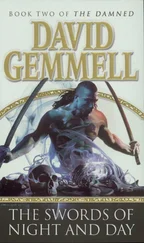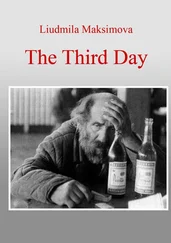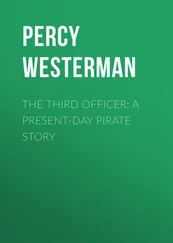David Epperson - The Third Day
Здесь есть возможность читать онлайн «David Epperson - The Third Day» весь текст электронной книги совершенно бесплатно (целиком полную версию без сокращений). В некоторых случаях можно слушать аудио, скачать через торрент в формате fb2 и присутствует краткое содержание. Жанр: Фантастика и фэнтези, на английском языке. Описание произведения, (предисловие) а так же отзывы посетителей доступны на портале библиотеки ЛибКат.
- Название:The Third Day
- Автор:
- Жанр:
- Год:неизвестен
- ISBN:нет данных
- Рейтинг книги:3 / 5. Голосов: 1
-
Избранное:Добавить в избранное
- Отзывы:
-
Ваша оценка:
- 60
- 1
- 2
- 3
- 4
- 5
The Third Day: краткое содержание, описание и аннотация
Предлагаем к чтению аннотацию, описание, краткое содержание или предисловие (зависит от того, что написал сам автор книги «The Third Day»). Если вы не нашли необходимую информацию о книге — напишите в комментариях, мы постараемся отыскать её.
The Third Day — читать онлайн бесплатно полную книгу (весь текст) целиком
Ниже представлен текст книги, разбитый по страницам. Система сохранения места последней прочитанной страницы, позволяет с удобством читать онлайн бесплатно книгу «The Third Day», без необходимости каждый раз заново искать на чём Вы остановились. Поставьте закладку, и сможете в любой момент перейти на страницу, на которой закончили чтение.
Интервал:
Закладка:
We didn’t say much to each other along the way, but eventually, Lavon couldn’t resist asking me what I really thought of it all.
I can’t believe I’m quoting a fictional detective,” I said, “but I think Sherlock Holmes may have pegged it pretty close.”
“What did he say?”
“Eliminate the impossible and whatever remains, however improbable, must be the truth.”
“The question is,” I continued, “have we eliminated the impossible?”
“You said the Brysons’ money is real enough,” he answered. “You couldn’t think of any other way they could have acquired so much.”
I had, and I still couldn’t.
“Let me ask you another thing,” I said. “How did Juliet react when you first showed up at her door with that story? Did she show any sign of doubt that what you were telling her was true?”
“That’s what surprised me. It was almost like she had expected the news — or perhaps she just felt a sense of relief, finally knowing what had happened to him.”
“A sense of closure, then?”
“Yes.”
***
By then, we had reached the outskirts of Jerusalem and took the exit to the road leading to Lavon’s dig.
From the highway, about a hundred meters away, the site resembled any one of the dozen nearby building projects. A chain link fence topped with a strand of razor wire surrounded the three-acre property, while a faded yellow Caterpillar backhoe and other well-worn earth moving equipment rested in the corner of a gravel parking lot.
We got out of the car and made our way to excavation headquarters, a secondhand construction trailer donated by a local builder. Lavon spoke briefly to the graduate student he had left in charge during his absence and then gave me a quick tour of the dig itself.
Their efforts focused on a half-acre plot at the northeastern corner of the site, with the work organized along the lines of a Wheeler box grid, a common archaeological technique that enabled a small professional staff to supervise a high number of eager but untrained volunteers.
“Imagine a chess board,” Lavon said, “with each square two meters by two meters. We leave the red squares alone, while we excavate the black ones. That way, we can measure both vertical and horizontal dimensions with precision.”
“Where did you find Bryson?” I asked.
He pointed to the far southwest corner, about 150 meters away from the primary excavation area, and we walked over to have a look.
“A couple of engineering students took our ground penetrating radar to the inactive areas of our site, just for practice. They found the collapsed cave and on an off-day, we decided to take a look.”
“And the skeleton?”
“We knew it was old, but without testing, we couldn’t say more, so we bundled it off to Radiometric. You know the rest.”
***
I did, and I also realized that I had asked where they had found Dr. Bryson without using a qualifier to indicate that I had some doubt as to the veracity of the story.
“Robert, let me ask you something: assuming for the moment that we’re not falling for some elaborate practical joke, what do you think he was doing in this location, in the first century?”
It didn’t take long for both of us to reach the obvious conclusion: Anno Domini — the Year of our Lord — the reason the first century is the first century, and not the fourth, or the eighteenth, or the 223rd.
Before I could say anything else, Lavon jumped up and ran back to the main excavation site, where he rushed into the trailer with a couple of graduate students in tow. A few minutes later, he emerged with a thick green binder and began to flip rapidly through the pages as he headed back toward me.
The file contained a thumbnail photograph and a brief description of every item — ancient or modern — that any worker had uncovered at the site, from the first day of the excavation until that very moment.
For the sake of scientific precision, and to fend off allegations of potential site contamination, the documents even recorded the details of a volunteer’s lost car keys that a doctoral candidate had found in one of the grids the following day.
I waited until he was out of earshot of the students to ask my question aloud.
“Has anyone located a missing video camera — one with some slight wear and tear, perhaps?”
My attempt at humor escaped him and he continued to flip through the printouts, but eventually he concluded no one had found such a device — at least not yet.
Finally, he closed the binder and just stared at the sky.
“Would a DVD or flash memory survive two millennia under the sand?” I asked.
Neither of us knew; nor did we have any way to determine whether Henry Bryson had met his end coming or going. Any recording device the diggers unearthed could just as easily be blank.
Chapter 8
We returned to the Brysons’ lab, both still jet-lagged from our whirlwind trip. Juliet led us into the conference room, where we were surprised to see that Markowitz and Bergfeld had not left Boston after all.
“I had to hear the rest of the story,” he said. “How was your trip?”
As Lavon and I explained what we had found in Israel, each of us struggled to come up with an alternative that fit the facts as we knew them. No one succeeded.
We could see, too, that Juliet had something else on her mind. Her face reflected a strange sense of peace, serenity almost, that didn’t square with her husband’s demise. I made the mistake of commenting on this.
“I’ve thought of little else since you left,” she said. “I came up with a plan, one that should require only a simple adjustment to the transport apparatus.”
“What kind of plan?” I asked.
“We can still save Henry, Mr. Culloden. Now that we have the precise coordinates of his whereabouts, a rescue should be straightforward.”
“But that means someone else will have to — ” Lavon cut himself short.
“Yes, Robert, and I am thankful that we have a person in this room so uniquely qualified for the task.”
I would have expected Lavon to jump at the chance, but to my surprise, his first impulse ran against the idea.
“He could have died somewhere else,” he protested. “There’s no guarantee anyone would find him alive in that cave.”
“No,” she replied, “but do you think a perfect stranger would have carried his body very far, in that climate?”
Lavon shook his head.
“And you told me yourself that his bones showed no signs of gross physical abuse. Did you mean that, or were you just trying to avoid causing me any more sorrow?”
“No, I meant it. The lab in Tel Aviv analyzed the skeleton with great care, given the discrepancies we found. I think it’s safe to assume he wasn’t executed, nor was he torn to pieces by a mob, or by wild animals.”
“Well, then, it should still be possible to save him.”
“Or leave two skeletons in that cave instead of one,” Lavon grumbled. “Your husband could have died from dozens of other causes that would have left no impact on his bone structure.”
The rest of us watched without saying a word.
“Robert, I implore you: you’re the only one who really understands that world. You’re the only one who speaks the language.”
“I read ancient Greek,” he said. “There’s a difference. Plus, not everyone in that area spoke Greek. If I encountered the wrong people, I’d be more likely to get a knife in my gut than directions to Jerusalem. In fact, that may have been what happened to your husband.”
“But you know he wasn’t robbed,” she replied. “You found a bag of Roman coins by his bones, did you not?”
Lavon nodded. The cache amounted to three months pay for a typical unskilled laborer. No brigand would have left that behind.
Читать дальшеИнтервал:
Закладка:
Похожие книги на «The Third Day»
Представляем Вашему вниманию похожие книги на «The Third Day» списком для выбора. Мы отобрали схожую по названию и смыслу литературу в надежде предоставить читателям больше вариантов отыскать новые, интересные, ещё непрочитанные произведения.
Обсуждение, отзывы о книге «The Third Day» и просто собственные мнения читателей. Оставьте ваши комментарии, напишите, что Вы думаете о произведении, его смысле или главных героях. Укажите что конкретно понравилось, а что нет, и почему Вы так считаете.












